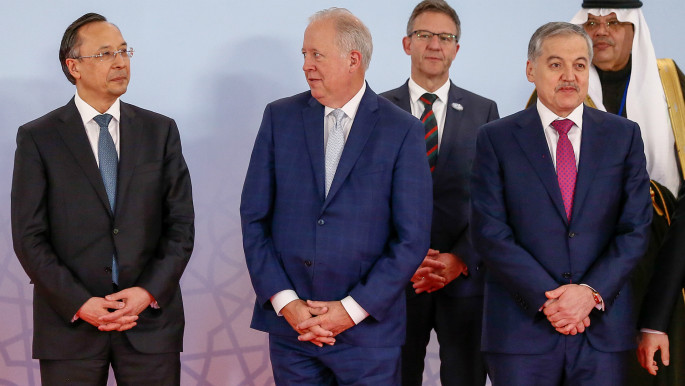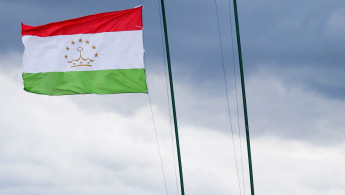America uses Tajikistan to help students learn Persian without 'fears for safety'
While most analysts will concede that Central Asia remains well within Russia's sphere of influence, the United States has found an essential ally in the former Soviet Union: Tajikistan, which hosts the largest Persian-speaking community outside Afghanistan and Iran.
The State Department has invested millions of dollars in training cadres of American students to speak languages such as Bengali, Indonesian, and Persian - an official language in Afghanistan, Iran, and Tajikistan - that are little-taught in the US.
Only Tajikistan, however, allows American students to learn Persian without fearing for their safety. The Islamic Revolutionary Guard Corps has detained several American citizens, including a student, and the Taliban has a habit of kidnapping Westerners.
Unlike Kabul and Tehran, the Tajik capital of Dushanbe presents few risks for American travellers, allowing the State Department to school a generation of Persian-speaking future diplomats.
"By improving my Persian language skills, I felt more politically and culturally informed than ever before," said Omeed Alidadi, an Iranian-American who studied in Tajikistan in winter and spring 2017 during his junior year at Boston College.
"I am now able to confidently read Iranian news and listen to the speeches made by the country's leaders. By learning first-hand how Persians live, and the unique attitudes and values they hold, the next generation of America's diplomatic corps may be equipped to make more educated decisions surrounding its Iran policy."
 |
By learning first-hand how Persians live, and the unique attitudes and values they hold, the next generation of America's diplomatic corps may be equipped to make more educated decisions surrounding its Iran policy |  |
As tensions between Iran and the US increase pressure on the Iranian immigrants who teach Persian at American universities, Americans such as Alidadi have turned to government-sponsored examples of cultural diplomacy such as the Fulbright US Student Programme, a State Department initiative that enables graduates to spend a year in other countries, among them Tajikistan.
The US embassy in Dushanbe referred questions to the Bureau of South and Central Asian Affairs, which, in turn, referred inquiries to the Bureau of Educational and Cultural Affairs, the State Department sub-agency overseeing most government-funded student exchange programmes.
"Over the past decade, the Fulbright Programme has sponsored US students to live, teach, and conduct research in Tajikistan," a State Department official told The New Arab.
"All Fulbright US Students are immersed in their local communities and develop greater appreciation of Tajikistan and Central Asia through building people-to-people relationships."
Read also: The cultural diplomacy bridging Oman and the US
Given the dearth of opportunities for American students to practice Persian, Tajikistan's relationship with the US ensures that they can still learn from Persian speakers.
"I chose to study Persian in Tajikistan because I wanted to learn in the most immersive language learning environment possible," Alidadi told The New Arab.
"I realised that while reputable, albeit few, Persian institutes exist at places such as University of Maryland or Arizona State University, none offer an experience comparable to living in Central Asia for a few months. Most important, the recent travel ban imposed on Iran may make it considerably harder for American universities to hire skilled Iranian language instructors than ever before."
Spending a year in Tajikistan, which hosts much of the Afghan and Iranian diasporas in its capital, provides Fulbright grantees the opportunity to practice up to three Persian dialects. Afghans speak Dari, Iranians Farsi, and Tajiks a dialect that shares their name.
"Fulbright US Students are encouraged to study Tajik, which, while sharing certain similarities and a level of mutual intelligibility with Farsi and Dari, is a distinct language with a rich cultural and linguistic history," explained the State Department official.
 |
|
| (L-R) Kazakhstan's Foreign Minister, US Under Secretary of State for Political Affairs and Tajikistan's Foreign Minister at the Afghanistan peace conference [Getty] |
Though language immersion forms part of the Fulbright Programme's purpose in countries such as Tajikistan, the initiative serves the wider goal of improving the relationship between Tajikistan and the US and teaching young American scholars to engage with Central Asia and Greater Iran.
The US considers both regions priorities in its geopolitical competitions with China, Iran, and Russia. The Fulbright Programme benefits the US' image in Tajikistan and strengthens ties between the two countries.
"In addition to the Fulbright US Student Programme in Tajikistan, the Fulbright Programme facilitates the exchange of experienced US scholars and specialists to Tajikistan, who are experts in their fields, to teach and conduct research alongside their Tajik colleagues," said the State Department official.
"Fulbright also brings Tajik scholars and graduate students, as well as Tajik language teaching assistants, to the United States."
Amid ongoing constraints on immigration from Iran, the contributions of Tajik academics can help the US fill the gaps in scholarship left by the enforced absence of Iranian experts.
 |
The US considers both regions priorities in its geopolitical competitions with China, Iran, and Russia |  |
"Through this exchange of students and scholars from both countries, the Fulbright Programme is fulfilling its founding mission to increase mutual understanding," the State Department official told The New Arab, emphasising the initiative's focus on cultural diplomacy.
The Fulbright Programme remains far from the only government grant available to American students eager to learn more about Greater Iran.
The Bureau of Educational and Cultural Affairs also organises the Benjamin A Gilman International Scholarship Programme, the Critical Language Scholarship Programme, and the National Security Language Initiative for Youth - all of which encourage students at the high-school and university levels to learn languages of interest to the State Department.
The State Department's intelligence agency, the Bureau of Intelligence and Research, administers the Title VIII Grant Programme, which allows Americans pursuing masters and doctoral degrees to conduct fieldwork in the post-Soviet states.
 |
Despite its cultural differences with Iran, Tajikistan is used as a substitute for American students interested in researching the Islamic Republic |  |
The Defense Department, meanwhile, funds the Boren Awards, grants that pay for up to $30,000 of language immersion in another country - as long as the recipient agrees to work for the federal government for at least a year after graduation.
All these initiatives send some students to Tajikistan, one of the US' closest allies in Central Asia.
Tajikistan's role as an international classroom for Americans studying Persian, which the Defense Department, the State Department, and the intelligence community all consider critical to their work, may prove its greatest contribution to the US.
Despite its cultural differences with Iran, Tajikistan is used as a substitute for American students interested in researching the Islamic Republic.
"Tajikistan presents the American student a culture similar to what he or she would find in the streets of Tehran," Alidadi told The New Arab of his experience in the country.
Austin Bodetti is a freelance journalist specialising in conflict in the Middle East.
He has reported from Indonesia, Iraq, Myanmar, South Sudan and Thailand, and his writing has appeared in Motherboard, The Daily Beast, USA Today, Vox, Wired, and Yahoo News.


![President Pezeshkian has denounced Israel's attacks on Lebanon [Getty]](/sites/default/files/styles/image_684x385/public/2173482924.jpeg?h=a5f2f23a&itok=q3evVtko)



 Follow the Middle East's top stories in English at The New Arab on Google News
Follow the Middle East's top stories in English at The New Arab on Google News


